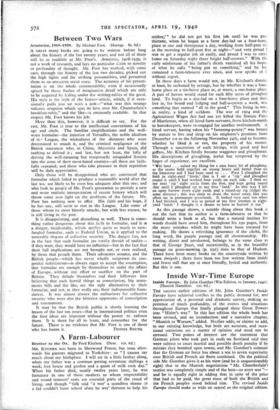A Farm-Labourer
Brother to the Ox. By Fred Kitchen. (Dent. los. 6d.) MR. KrraiEbt was born in Sherwood Forest, but soon after- wards his parents migrated to Yorkshire : so " I cannot say much about my birthplace. I will set in a little farther along, when my father was a cowman getting seventeen shillings a week, free house and garden and a quart of milk each day." When his father died, nearly twelve years later, he was fortunate in one of those mothers to whom respectability and sound trousers' seats are essential parts of the creed of living, and though " folk said ' it wee a scandless shame as a lad couldn't leave school afore he wer' thirteen to help his wither,'" he did not get his first job until he was past
thirteen, when he began as a farm day-lad on a four-hors( place at one and threepence a day, working from iialf-past six in the morning to half-past five at night—" and very proud I was to get a regular job s8 easily, and proud I was to carry
home on Saturday night three bright half-crowns." With the early misfortune of his father's death vanished all his hopes of what he calls " being put to something," and he has remained a farm-labourer ever since, and now speaks of i without regret.
In those days a farm would not, in Mr. Kitchen's distric at least, be reckoned by acreage, but by whether it was a four- horse place, or a six-horse place or, at worst, a one-horse place A pair of horses would stand for each fifty acres of plotighe( land. To begin as a day-lad on a four-horse place and the: live in, for board and lodging and half-a-crown a week, wa something that seemed " all to the good." This living in wa
in reality, a kind of serfdom. The war of 1914 and th Agricultural Wages Act had not yet killed the Statute Fair of Martlemas, when all hired farm-servants, from kitchen-maid to horsekeepers, were re-engaged for another twelvemonth. A hired servant, having taken his " fastening-penny," was bound
by statute to live and sleep on his employer's premises from December 1st to the following November 24th, and to become whether he liked it or not, the property of his master.
Through a succession of such hirings, with good and bad gaffers, Mr. Kitchen finally became waggoner and ploughman.
His descriptions of ploughing, joyful but tempered by the finger of experience, are excellent.
" Wet land . .. suited my liking for a nice fancy bit of ploughing, as the seams hold together on strong heavy soil better than on the limestone soil I had been used to . . . First I ploughed the field in eight-yard ' lands,' that is I set a ' rig' and ploughed round it until I had worked four yards on each side. I then set my next ' rig ' eight yards from the first, and kept going round that until I ploughed up to my first ' land.' In this way I left an open furrow every eight yards and a raised-up rig (ridge) the same distance ; this was done to drain the water away, like you often see in permanent grasslands. It looked very neat too when I had finished, and I was so proud of my .first attempt at eight- yard ' lands' I thought it a shame to have to harrow it out."
As this passage shows, a notable thing about this book is not the fact that its author is a farm-labourer or that he should write a book at all, but that a natural instinct for words should have saved him, throughout his 25o pages, from the many mistakes which he might have been excused for making. He shows a refreshing ignorance of the cliché, the long word, the purple passage and all showmanship. His writing, direct and unadorned, belongs to the same class as that of George Stun, and occasionally, as in the beautiful passage on grass-mowing -(p. 152); rises to that of Hudson. There have been many books on the countryside written by town emigres ; there have been too few written from inside and fewer still that are at once friendly, lyrical and authentic. But this is one.










































 Previous page
Previous page